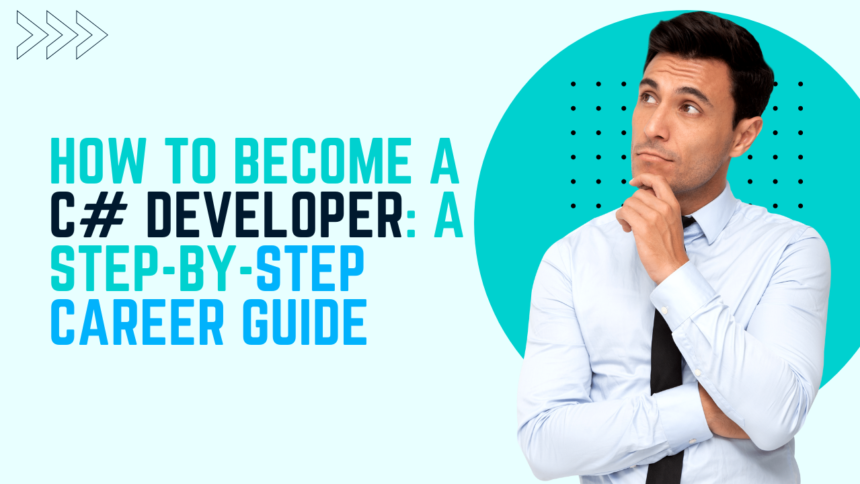Are you intrigued by the world of software development? Becoming a C# developer is an exciting journey that opens doors to countless opportunities in tech. In this guide, we’ll explore everything you need to know, from the foundational skills to advanced techniques. Let’s dive into how to become a C# developer!
Understanding C# and Its Importance
Before we get into the nitty-gritty of becoming a C# developer, let’s take a moment to understand why C# is such a vital programming language. Developed by Microsoft, C# is widely used for building Windows applications, web services, and even game development using Unity. Its versatility and robust features make it a favorite among developers.
What Makes C# Stand Out?
- Object-Oriented: C# is built on object-oriented principles, allowing for reusable code and a structured approach to programming.
- Versatile: You can use C# for various types of applications, including web apps, mobile apps, and game development.
- Strong Community Support: With a vast number of resources and a supportive community, learning C# becomes easier.
By understanding these key points, you’re already laying the groundwork for your C# developer journey.
Step 1: Getting Started with the Basics
The first step in your journey to becoming a C# developer is mastering the basics. This involves understanding the syntax, structure, and foundational concepts of C#.
Recommended Resources
- Books: Start with books like “C# in a Nutshell” and “Head First C#.” These provide a solid foundation.
- Online Courses: Websites like Coursera, Udemy, and Codecademy offer excellent C# courses tailored for beginners.
Practice Makes Perfect
Once you’ve grasped the basics, put your knowledge to the test. Create simple projects, such as a basic calculator or a to-do list application. This will reinforce your learning and help you gain confidence in coding.
Step 2: Intermediate Concepts
As you become comfortable with the fundamentals, it’s time to delve into intermediate concepts. Here are some crucial topics you should focus on:
1. Data Types and Control Structures
Understanding data types (int, string, bool, etc.) and control structures (if statements, loops) is essential for writing efficient code.
2. Object-Oriented Programming (OOP)
Master the principles of OOP, including encapsulation, inheritance, and polymorphism. These concepts will be vital as you build more complex applications.
3. Exploring Delegates in C#
A powerful feature of C# is the use of delegates in C#, which allows methods to be passed as parameters. Understanding this can significantly enhance your programming skills.
4. Working with Libraries and Frameworks
Familiarize yourself with the .NET Framework and .NET Core, as well as essential libraries. This knowledge will be invaluable as you develop applications.
Step 3: Advanced Techniques
Once you’ve built a solid foundation and grasped intermediate concepts, it’s time to explore advanced techniques that will set you apart as a C# developer.
1. Extension Methods in C#
Learn how to use extension methods in C# to add functionality to existing types. This feature is incredibly useful for creating more readable and maintainable code.
2. Asynchronous Programming
Understanding asynchronous programming can help you create responsive applications. Familiarize yourself with async and await keywords to manage tasks efficiently.
3. Design Patterns
Explore common design patterns like Singleton, Factory, and Observer. Knowing these will improve your ability to create scalable and maintainable code.
Step 4: Building Real-World Projects
Now that you’ve acquired theoretical knowledge, it’s time to put it into practice. Start building real-world projects that showcase your skills.
Ideas for Projects
- Web Applications: Build a personal blog or a portfolio website using ASP.NET.
- Game Development: Use Unity to create a simple game.
- APIs: Develop a RESTful API for a service you’re passionate about.
Collaborate and Contribute
Consider contributing to open-source projects or collaborating with other developers. This experience will enhance your skills and expand your network.
Step 5: Networking and Job Searching
As you approach the end of your learning journey, it’s time to start networking and job searching.
1. Create a Strong Portfolio
Make sure to have a portfolio that showcases your best projects. Include detailed descriptions of your work, the technologies you used, and your contributions.
2. Leverage Online Platforms
Use platforms like LinkedIn, GitHub, and Stack Overflow to connect with other developers, showcase your work, and look for job opportunities.
3. Prepare for Interviews
Practice common technical interview questions and coding challenges. Websites like LeetCode and HackerRank can help you refine your skills.
Step 6: Continuous Learning and Growth
Even after landing your first job as a C# developer, your learning journey doesn’t stop. Technology is always evolving, and staying updated is crucial.
1. Follow Industry Trends
Subscribe to tech blogs, join forums, and follow C# development communities on social media to keep abreast of new developments.
2. Learn New Technologies
Explore related technologies, such as Azure for cloud services, or dive deeper into frameworks like Xamarin for mobile development.
3. Consider Certifications
Certifications, such as Microsoft Certified: C# Developer, can enhance your resume and validate your skills in the eyes of potential employers.
Conclusion
Becoming a C# developer is a fulfilling and lucrative career choice. By following this step-by-step guide, you’ll build a solid foundation in C# and develop the skills necessary to thrive in the tech industry. Remember, the key to success is continuous learning and practical experience. Embrace challenges, seek opportunities, and you’ll be well on your way to becoming a successful C# developer!
As you embark on this exciting journey, don’t forget to explore advanced topics such as delegates in C# and extension methods in C# to elevate your skills further. Good luck!
FAQ:
Q1: How long does it take to become a C# developer?
The time it takes to become proficient varies based on your prior experience and the amount of time you dedicate to learning. Generally, with consistent effort, you can become job-ready within 6-12 months.
Q2: Do I need a degree to become a C# developer?
While a degree in computer science can be beneficial, many developers are self-taught. Focus on building a strong portfolio and gaining practical experience to showcase your skills.
Q3: What is the salary range for C# developers?
Salary can vary widely based on location, experience, and the industry you work in. Entry-level positions may start around $50,000, while experienced developers can earn $100,000 or more annually.
Q4: Can I transition from another programming language to C#?
Absolutely! Many concepts in programming are transferable, and if you already have experience with languages like Java or C++, you may find C# easier to learn.
Q5: What tools should I use as a C# developer?
Familiarize yourself with Visual Studio as your primary IDE. Also, consider using tools like Git for version control and Docker for containerization.







